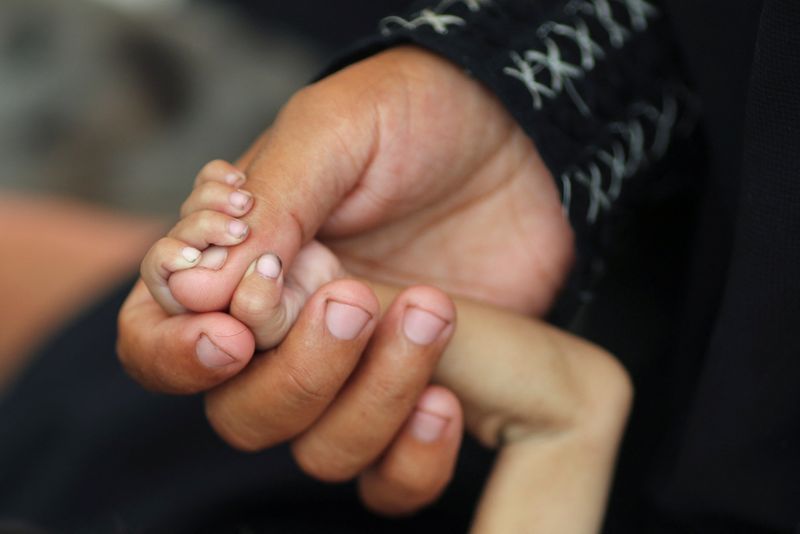GAZA (Reuters) -Ibrahim al-Najjar said he lost his five-year-old son Naim to malnutrition that is ravaging Gaza. One year later, he is still grieving while scrambling to make sure his other children don’t suffer the same fate.
“This child will follow him,” the Palestinian former taxi driver said, pointing to his 10-year-old son Farah. “For about a month he’s been falling unconscious. This child was once double the size he is now.”
Najjar, 43, held up a medical certificate that shows Naim died on March 28, 2024. The whole family has been displaced by nearly two years of Israeli air strikes.
The Najjars had been used to eating three meals a day before the war broke out in October 2023 – after Hamas-led Palestinian militants attacked Israel – but now they can only dream of even simple foods such as bread, rice, fruit and vegetables.
Naim’s brother Adnan, 20, focuses on taking care of his other brothers, rising every morning at 5:30 a.m. to wend his way gingerly through Gaza’s mountains of rubble to find a soup kitchen as war rages nearby.
“I swear I don’t have salt at home, I swear I beg for a grain of salt,” said Naim’s mother Najwa, 40.
“People talk about Gaza, Gaza, Gaza. Come see the children of Gaza. Those who do not believe, come see how Gaza’s children are dying. We are not living, we are dying slowly,” she said.
Five more people died of malnutrition and starvation in the Gaza Strip in the previous 24 hours, the enclave’s health ministry said on Wednesday, raising the number of deaths from such causes to at least 193 Palestinians, including 96 children, since the war began.
FAMINE SCENARIO
A global hunger monitor has said a famine scenario is unfolding in the Gaza Strip, with starvation spreading, children under five dying of hunger-related causes and humanitarian access to the embattled enclave severely restricted.
And the warnings about starvation and malnutrition from aid agencies keep coming.
The United Nations Office for the Coordination of Humanitarian Affairs (OCHA) said food consumption across Gaza has declined to its lowest level since the onset of the war.
Eighty-one percent of households in the tiny, crowded coastal territory of 2.2 million people reported poor food consumption, up from 33 percent in April.
“Nearly nine out of ten households resorted to extremely severe coping mechanisms to feed themselves, such as taking significant safety risks to obtain food, and scavenging from the garbage,” OCHA said in a statement.
Even when Palestinians are not too weak to access aid collection points, they are vulnerable to injury or death in the crush to secure food.
Between June and July the number of admissions for malnutrition almost doubled – from 6,344 to 11,877 – according to the latest UNICEF figures available.
Meanwhile there is no sign of a ceasefire on the horizon, although Israel’s military chief has pushed back against Prime Minister Benjamin Netanyahu’s plans to seize areas of Gaza it doesn’t already control, three Israeli officials said.
Netanyahu has vowed no end to the war until the annihilation of Hamas, which killed 1,200 people and took 251 hostage in its Oct. 7 attack, according to Israeli tallies.
Israel’s military response has killed over 60,000 people, according to Gaza health authorities, and turned Gaza, one of the world’s most densely populated areas, into a sea of ruins, with many feared buried underneath.
‘THE SHADOW OF DEATH’
Holding her emaciated baby Ammar who, she said, is wasting away from malnutrition, Amira Muteir, 32, pleaded with the world to come to the rescue.
“The shadow of death is threatening him, because of hunger,” she said, adding that he endures 15 or 20 days a month with no milk so she waits hours at a hospital for fortified solution.
Sometimes he has to drink polluted liquids because of a shortage of clean water, she said.
Muteir and her children and husband rely on a charity soup kitchen that helps them with one small plate of food per day to try and survive. “We eat it throughout the day and until the following day we eat nothing else,” she said.
(Additional reporting by Nidal Al- Mughrabi in Cairo and Olivia Le Poidevin in Geneva; writing by Michael Georgy; editing by Mark Heinrich)

